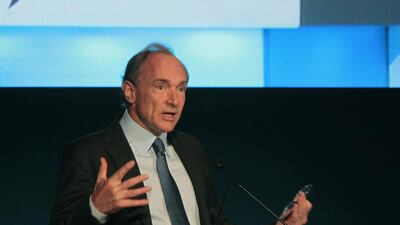DUBAI // The inventor of the World Wide Web used his address to the first Knowledge conference to make an impassioned plea to keep the internet open, free and accessible.
“Let us use the openness of the web and the knowledge we share to enhance our different cultures and understanding of other cultures; let us use it to break down barriers and borders; that is very important for peace in the world,” said Sir Tim Berners-Lee, who along with Jimmy Wales, the co-founder of Wikipedia, were the first winners of the Sheikh Mohammed bin Rashid Al Maktoum Knowledge award for their contribution in spreading knowledge, and jointly collected a US$1 million (Dh3.7m) prize on Sunday.
An open and free web was the basis for transfer and creation of knowledge, Mr Berners-Lee told hundreds of delegates while speaking about his 25-year effort of inventing, promoting and defending the internet.
“One of the most important properties is its openness,” he said. “A strong government will allow debate and discussion, and in the 25th anniversary we should not take the communication infrastructure of the web for granted.
“We should try to reach people who don’t have access because the majority are still not connected. This places a huge responsibility on those of us who are connected because we have the responsibility to ensure that it [the internet] is open and free.”
It was vital to use the web to empower youth and women, Mr Berners-Lee said.
“Teach your students to be data aware, teach your children to code whether or not they are going to be programmers,” he said.
Asked what would be the next big innovation, he spoke of pooling knowledge and resources.
Mr Wales said it was important to draw people in to contribute on diverse topics.
In the 13 years since he started the Wikipedia community, there have been 32 million articles in 287 languages uploaded, with Arabic the 12th largest with 341,000 articles.
“Arabic is a vibrant language and is the fifth best among the large languages in terms of collaborative depth,” Mr Wales said. “It is placed to move strongly going forward.”
The likelihood of the internet reaching millions who did not have access before could create instability, particularly in poor African nations, Mr Wales predicted.
“The internet is coming to the next 2 to 3 billion people and I believe it’s coming to these people faster than anticipated, even within the internet industry, because the growth we are seeing in inexpensive, smartphones has outpaced a lot of people’s predictions,” he said.
“That is going to mean an enormous cultural upheaval as people who previously had almost no access to knowledge suddenly have huge access. It’s also going to cause a lot of unrest and instability, some of it in poor African countries.”
rtalwar@thenational.ae


